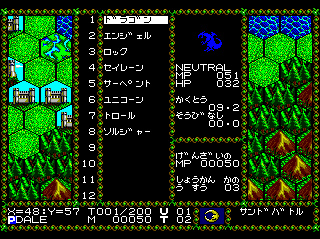Time to venture into foreign territory once again, with Master of Monsters for the Japanese PC Engine, published on the platform's 1.0 CD-ROM format in 1988 by SystemSoft Corporation. This was the first console entry in a series that began on Japanese PC's and spanned several hardware generations in Japan -- Saturn, Playstation, PS2 and PSP sequels and remakes exist -- but only the Genesis/Mega Drive game was published in the US. Most of the detail is in Japanese, but there's enough English to make this one playable by uninformed Westerners like me.
As with most of these early CD games, the extra storage is used to deliver a narrated, illustrated introduction --as is so often the case in fantasy games, the citizens' idyllic existence is suddenly interrupted by the arrival of a tyrannical dragon:
After the introductory sturm und drang, we segue into the game proper. Master of Monsters is a hex-based fantasy strategy game with echoes of Archon -- units include griffons, demons, warriors, and so forth, and the early stages of the game consist mostly of moving units around, with actual enemy encounters occurring later, when opposing players' units finally start to run into each other. The game supports up to 4 battling armies, either player- or computer-controlled, starting at considerable distance from each other on a sprawling world map:
Movement range is restricted based on unit type -- flying units move quickly, ground-based units less so. The display helpfully outlines possible destinations during movement, by throwing inaccessible hexes into black-and-white relief:
The initial goal is to take over towers (increasing the T counter at the bottom center of the screen), generating more energy and strength for the battles ahead. I didn't realize this at first, even though I saw the computer-controlled forces occupying towers at a feverish pace, so I was at a serious disadvantage on my first try.
The units at the player's command have Japanese names, of course, but they're classical types, and the statistics aren't too hard to interpret with Western eyes. Units gain experience in battle, and the number of active units is limited by the player's available resources -- stronger units cost more to deploy, and towers must be defended to prevent another army from walking in and taking them over. The unit types are distinct, with complementary strengths and weaknesses, so there are a number of workable strategies available.
The main map screen doesn't really take advantage of the CD format -- each player has a chiptune theme that plays during his or her turn, and the map appears to be held in memory with no spooling from the disc. But the unit-vs.-unit battles are accompanied by generic CD rock, with large, detailed character graphics and location-specific backdrops that wouldn't have easily fit on a HuCard:
Master of Monsters is a decent, deep strategy game, competently executed, but the pacing has not dated well -- I found it difficult to maintain engagement with its turn-based gameplay after a while. The computer AI is reasonably smart but woefully sluggish on the PC Engine, and as the map view is blocked by generic trees whenever it's not the player's turn, one can't even anticipate, watch or learn from the opponents' strategy decisions.
The large scale of the map means that after one gets the hang of the controls, the game becomes a matter of executing one's own moves, waiting for several minutes while the other three armies do their thing, and repeating. If a unit is destroyed in battle, it may take quite a while to get a new unit deployed and moved into position -- this raises the stakes in interesting ways, but there's no quick way to recover or retreat from a serious strategic error, leaving the player with little to do but watch while the home team's units are methodically decimated. Gameplay can be accelerated by enabling fewer players at the start -- one player versus a single computer player is a bit more tolerable -- but the game still becomes repetitive. Presumably victory consists of wiping out all of the opponents' units, but the time investment required to do so is likely to make 21st-century players yearn for something a little more streamlined.
If a slower-paced strategy game appeals, allowing plenty of time for cups of coffee and bathroom breaks, you may be able to find the PC Engine version of Master of Monsters for purchase at this affiliate link.
Thursday, July 1, 2010
Subscribe to:
Post Comments (Atom)













No comments:
Post a Comment